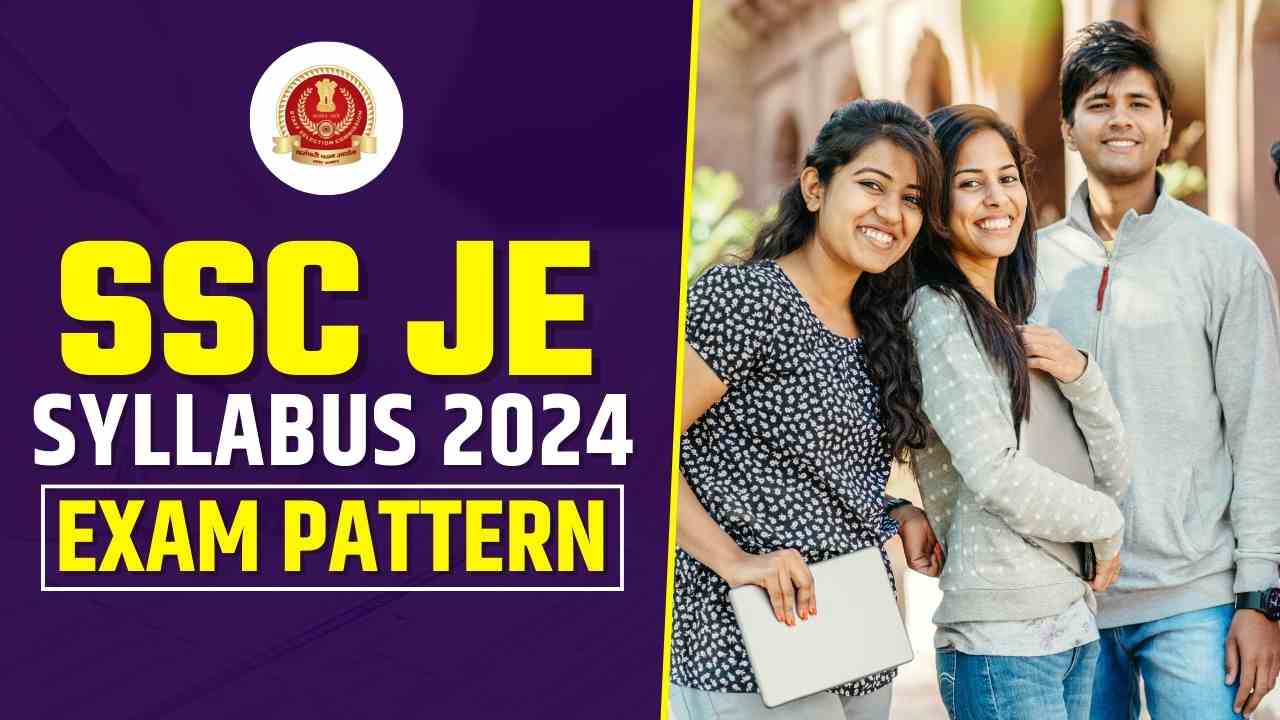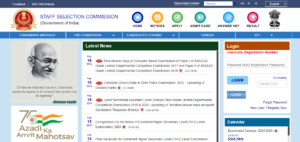SSC JE Syllabus 2024: कर्मचारी चयन आयोग जल्द ही जूनियर इंजीनियर पदों के लिए भर्ती प्रक्रिया शुरू करेगा। जो व्यक्ति मई-जून 2024 में आयोजित होने वाली जेई भर्ती परीक्षा की तैयारी कर रहे हैं, वे एसएससी जेई पाठ्यक्रम और परीक्षा पैटर्न का पालन करके अपनी तैयारी शुरू कर सकते हैं। तो अब इस पेज की मदद से अपनी तैयारी शुरू करें।


SSC JE Syllabus 2024 Overview
|
Full Exam Name |
Staff Selection Commission Junior Engineers Exam |
|
Short Exam Name |
SSC JE |
|
Exam Conducting Body |
Staff Selection Commission |
|
Frequency of Conduct |
Once a year |
|
Languages |
English, Hindi |
|
Mode of Counselling |
Online/Offline |
|
SSC JE Paper 1 – Duration |
2 hours |
|
SSC JE Selection Process |
|
|
SSC JE Exam Date |
May – June 2024 |
|
Official Website |
ssc.nic.in |
SSC JE Exam Pattern
According to the Staff Selection Commission JE Exam Pattern, both papers will be conducted in in online mode of 200 marks and 300 marks respectively. Candidates can check here the exam pattern for both papers of Junior ENgineer.
SSC JE Paper 1 Exam Pattern
- Duration: 2 hours (2 hours and 40 minutes for candidates eligible for scribe.)
|
Sections |
Number of Questions |
Total marks |
|
General Intelligence Reasoning |
50 |
50 |
|
General Awareness |
50 |
50 |
|
General Engineering Part – A (Civil & Structural) or Part – B (Electrical) or Part – C (Mechanical) |
100 |
100 |
SSC JE Paper 2 Exam Pattern
Duration: 2 hours (2 hours and 40 minutes for candidates eligible for scribe.)
|
Parts |
Subject |
Total Marks |
|
Part-A Part- B Part-C |
General Engineering (Civil & Structural) or General Engineering (Electrical) or General Engineering (Mechanical) |
300 |
SSC JE Syllabus 2024
The SSC Junior Engineer Examination comprises two levels which are Tier I and Tier II. After passing the both Tier I and Tier II Examination, candidates will be called for Document Verification Rounds. Candidates can check here the SSC JE Syllabus for both Paper 1 and Paper 2.
SSC JE Paper 1 Syllabus 2024
|
Subjects |
Topics for SSC JE Syllabus |
|
SSC JE Syllabus for General Intelligence & Reasoning |
|
|
SSC JE Syllabus for General Awareness |
|
|
SSC JE Syllabus for Part A Civil |
|
|
SSC JE Syllabus for Structural Engineering |
|
|
SSC JE Syllabus for Part B Electrical Engineering |
|
|
SSC JE Syllabus for Part C Mechanical Engineering |
|
SSC JE Paper 2 Syllabus
In Paper 2 Junior Engineer Exam, the questions asked will be objective type. Candidates can check here the SSC JE Syllabus for Electrical Engineering, Civil Engineering and Mechanical Engineering.
SSC JE Syllabus for Paper 2 Civil Engineering
|
Civil Engineering units |
Topics for SSC JE Syllabus |
|
Building Materials |
|
|
Estimating, Costing and Valuation |
|
|
Surveying |
|
|
Hydraulics |
|
|
Irrigation Engineering |
Hydrology –
|
|
Transportation Engineering |
Highway Engineering –
Pavement Materials –
|
|
Environmental Engineering |
|
SSC JE Syllabus for Paper 2 Structural Engineering
|
Units |
Topics for SSC JE Syllabus |
|
Theory of structures |
|
|
Concrete Technology |
|
|
RCC Design |
|
|
Steel Design |
|
SSC JE Syllabus for Paper 2 Electrical Engineering
|
Units |
Topics for SSC JE Syllabus |
|
Basic concepts |
|
|
Circuit Law |
|
|
Magnetic Circuit |
|
|
AC Fundamentals |
|
|
Measurement and Measuring Instruments |
|
|
Electrical Machines |
|
|
Synchronous Machines |
|
|
Generation, Transmission & Distribution |
|
|
Estimation and Costing |
|
|
Utilization of Electrical Energy |
|
|
Basic Electronics |
|
SSC JE Syllabus for Paper 2 Mechanical Engineering
|
Units |
Topics for SSC JE Syllabus |
|
Theory of Machines and Machine Design |
|
|
Engineering Mechanics and Strength of Materials |
|
|
Thermal Engineering |
|
|
Fluid Mechanics & Machinery |
|
|
Production Engineering |
Classification of Steels:
NDT, Foundry & Casting –
|
Important Links
| SSC JE Recruitment | Click Here |
| SSC Exam Calender | Click Here |
| Official Website | Click Here |
FAQs Related to SSC JE Syllabus 2024
Answer: Yes, for every wrong response, there is a deduction of 1/3 of the marks in the SSC JE Paper 1 examination.
Answer: The Staff Selection Commission will conduct two papers along with another process for the JE exam as follows –
-
SSC JE Paper 1 (MCQ type)
-
SSC JE Paper 2 (MCQ type)
-
Document Verification
- Medical Examination

